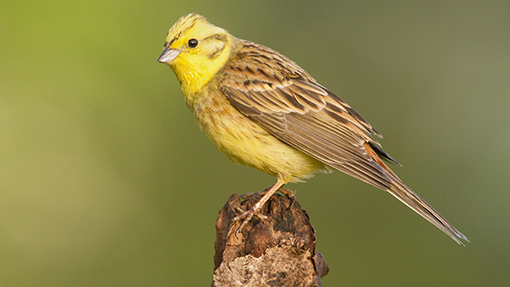Agri-environment scheme aims to boost farmland birds

Farm minister George Eustice paid a visit to the RSPB’s Hope Farm to see how farming methods can be employed to reverse the decline in farmland birds.
Mr Eustice said his visit to the 181ha conventional arable farm in Cambridgeshire offered him a chance to learn how profitable farming and increasing the population of farmland birds could work together.
In November, Defra will be outlining some of the options of the New Environmental Land Management Scheme (Nelms), which will replace environmental stewardship in England.
Nelms agreements are expected to start in January 2016 when farmers will be paid under Pillar 2 of CAP (rural development) to introduce measures to restore, preserve and enhance the natural environment.
See also: Agri-environment scheme ‘not fit for purpose’
The scheme will be targeted so that farmers can help deliver specific environmental targets related to their local area. These will seek to increase biodiversity, help wildlife and improve water quality.
One area that Defra is focusing on is paying farmers to introduce practical measures on farm to reverse the decline in rare farmland birds, such as skylark, linnet, reed bunting and yellowhammer.
Mr Eustice said: “The decline in farmland birds in recent decades has been a real cause for concern.
“But we can learn a huge amount from projects like that at Hope Farm, which demonstrate that often simple measures can have a real impact.
“That’s why we are introducing a new scheme from 2016 to help farmers do even more for this valuable wildlife.”
Although no options have been finalised, Mr Eustice hinted that Defra was looking at three key management prescriptions for farmland birds.
These include:
• Good habitats for birds to nest, such as hedgerows and woodland areas
• Providing enough food to rear their chicks
• Addressing the overwintered seed food shortage for birds, especially between Christmas and spring.
Mr Eustice said Nelms would be similar in its approach to the existing entry- and higher-level stewardship schemes, but there will be a number of new options available.
He added: “Farmers are conservationists too and they have a love of the countryside.
“We have learned through these Pillar 2 agri-environment schemes [ELS and HLS] and we are keen to reward them [farmers] for the things that they do.”
Abi Bunker, head of the RSPB’s agricultural policy team, met Mr Eustice on Friday’s visit to Hope Farm.
She said: “It has been great to host the farm minister at Hope Farm, and we welcome his ongoing commitment and interest in wildlife friendly farming.
“Agri-environment schemes have proven a lifeline for nature while helping to maintain viable farm businesses, and it’s key that the new scheme builds on this success.
“It’s crucial now that the measures we know work for farmland wildlife are given priority, and that the farmers doing the most for nature are put centre stage.”
NFU vice-president Guy Smith said he welcomed Mr Eustice’s vision for Nelms, and said his words would resonate well with thousands of farmers in existing agri-environment agreements.
But he added: “Our worry is that as agri-environment schemes come to an end over the next few years many agreement holders will struggle to get into Nelms.
“This is primarily about design rather than about budget. We would encourage the minister to make Nelms as inclusive as possible. We have a generation of farmers out there who have taken up the conservation challenge. It’s important we keep as many of them as possible in Nelms.”
